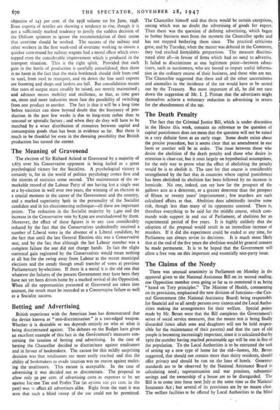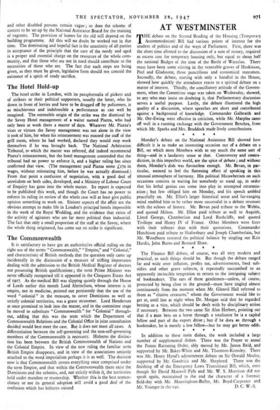The Claims of the Needy
There was unusual unanimity in Parliament on Monday in the approval given to the National Assistance Bill on its second reading, one Opposition member even going so far as to commend it as being " based on Tory principles." The Minister of Health, commenting on its provisions, emphasised the new division of functions—the Cen- tral Government (the National Assistance Board) being responsible for financial aid to all needy persons over sixteen and the Local Autho- rities making the arrangements for their welfare. Special points made by Mr. Bevan were that the Bill completes the Government's series of social service measures, that the means test is being finally discarded (since adult sons and daughters will not be held respon- sible for the maintenance of their parents) and that the care of old people is becoming increasingly important, since it is calculated that by 197o the number having reached pensionable age will be one in five of the population. To the Local Authorities is to be entrusted the task of setting up a new type of home for the old—homes, Mr. &van suggested, that should not contain more than thirty residents, should offer privacy and should be run on the lines of hotels. Generous standards are to be observed by the National Assistance Board in calculating need ; superannuation and war pensions, substantial savings and the ownership of a house are to be disregarded. The Bill is to come into force next July at the same time as the National Insurance Act ; but several of its provisions are by no means clear. The welfare facilities to be offered by Local Authorities to the blind and other disabled persons remain vague ; so does the scheme of centres to be set up by the National Assistance Board for the training of vagrants. The provision of homes for the old will depend on the building programme. All this will no doubt be worked out in due time. The dominating and hopeful fact is the unanimity of all parties in acceptance of the principle that the care of the needy and aged is a proper and essential charge on the resources of the whole com- munity, and that those who are not in need should contribute to the necessities of those who are. The fact that such steps are being given, as they must be given, legislative form should not conceal the existence of a spirit of ready sacrifice.





























 Previous page
Previous page